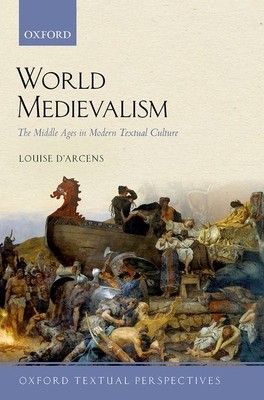
- We will send in 10–14 business days.
- Author: Louise D'Arcens
- Publisher: Oxford University Press, USA
- ISBN-10: 0198825943
- ISBN-13: 9780198825944
- Format: 13.7 x 20.1 x 2 cm, hardcover
- Language: English
- SAVE -10% with code: EXTRA
Reviews
Description
World Medievalism: The Middle Ages in Modern Textual Culture explores the ways in which a range of modern textual cultures have continued to engage creatively with the medieval past in order to come to terms with the global present. Building its argument through four case studies--from theMiddle East, France, Southeast Asia, and Indigenous Australia--it shows that to understand medievalism as a cultural idiom with global reach, we need to develop a more nuanced grasp of the different ways 'the Middle Ages' have come to signify beyond Europe as well as within a Europe that has been
transformed by multiculturalism and the global economy. The book's case studies are explored within a conceptual framework in which medievalism itself is formulated as 'world-disclosing' a transhistorical encounter that enables the modern subject to apprehend the past 'world' opened up in medieval
and medievalist texts and objects. The book analyses the cultural and material conditions under which its texts are produced, disseminated, and received, and examines literature alongside films, television programs, newspapers and journals, political tracts, as well as such material and artefactual
texts as photographs, paintings, statues, buildings, rock art, and fossils. While the case studies feature distinctive localised forms of medievalism, taken together they reveal how imperial and global legacies have ensured that the medieval period continues to be perceived as a commonly held past
that can be retrieved, reclaimed, or revived in response to the accelerated changes and uncertainties of global modernity.
EXTRA 10 % discount with code: EXTRA
The promotion ends in 20d.04:35:52
The discount code is valid when purchasing from 10 €. Discounts do not stack.
- Author: Louise D'Arcens
- Publisher: Oxford University Press, USA
- ISBN-10: 0198825943
- ISBN-13: 9780198825944
- Format: 13.7 x 20.1 x 2 cm, hardcover
- Language: English English
Middle East, France, Southeast Asia, and Indigenous Australia--it shows that to understand medievalism as a cultural idiom with global reach, we need to develop a more nuanced grasp of the different ways 'the Middle Ages' have come to signify beyond Europe as well as within a Europe that has been
transformed by multiculturalism and the global economy. The book's case studies are explored within a conceptual framework in which medievalism itself is formulated as 'world-disclosing' a transhistorical encounter that enables the modern subject to apprehend the past 'world' opened up in medieval
and medievalist texts and objects. The book analyses the cultural and material conditions under which its texts are produced, disseminated, and received, and examines literature alongside films, television programs, newspapers and journals, political tracts, as well as such material and artefactual
texts as photographs, paintings, statues, buildings, rock art, and fossils. While the case studies feature distinctive localised forms of medievalism, taken together they reveal how imperial and global legacies have ensured that the medieval period continues to be perceived as a commonly held past
that can be retrieved, reclaimed, or revived in response to the accelerated changes and uncertainties of global modernity.


Reviews